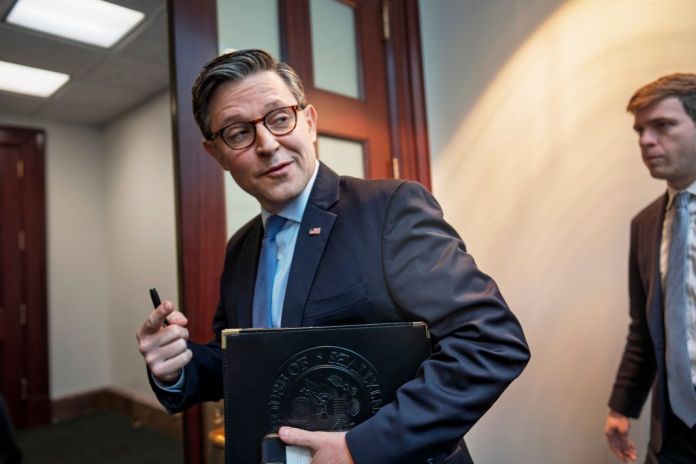Senate leaves for the weekend with no shutdown deal in sight
the U.S. Senate adjourned for the weekend without reaching an agreement to prevent a government shutdown. The ongoing dispute centers on government funding, with Democrats insisting on including protections for healthcare subsidies under Obamacare, which are set to expire at the end of the year. Republicans proposed a “clean” seven-week funding extension, which passed the House but was rejected in the Senate alongside the Democrats’ competing plan that includes subsidy preservation and rolls back Medicaid reforms.
Both proposals failed to secure the 60 votes needed to overcome a filibuster, leading to continued gridlock. Senate Republicans accuse Democrats of using the funding debate as leverage by tying it to policy issues (“hostage-taking”), while Democrats maintain they will not support funding without healthcare subsidy commitments.
Senate Majority Leader John thune (R-SD) and Speaker Mike Johnson (R-LA) blamed Democrats for the stalemate and sent senators home with plans for another vote early next week. The House, currently in recess, plans to return as well, though it’s schedule might change.
Key Senate Democrats John Fetterman, Catherine Cortez Masto, and Angus King voted with Republicans on the GOP bill, while Rand Paul was the sole Republican opposing it. the fight is expected to continue into next week, with health care subsidy preservation being the central sticking point preventing a resolution.
Senate leaves for the weekend with no shutdown deal in sight
A fight over government funding will spill into next week after senators left Washington dug in over how to resolve Democratic demands over healthcare.
For the fourth time, the Senate rejected dueling proposals to reopen the government – a “clean,” seven-week extension introduced by Republicans and another from Democrats that preserves Obamacare subsidies that expire at the end of the year.
The GOP proposal, which passed the House last month, garnered some cross-party support, with two Democrats and one independent voting with Republicans. But the outcome, a 54-44 vote, was in line with two prior attempts at Senate passage, signaling Senate Minority Leader Chuck Schumer’s (D-NY) coalition is holding firm on the third day of the government shutdown.
All Republicans voted against the Democratic proposal, which also rolls back the Medicaid reforms in President Donald Trump’s tax law. Both were subject to the filibuster, meaning 60 votes were required for either to advance.
SENIOR HOUSE DEMOCRAT DARES GOP TO END SHUTDOWN BY NUKING SENATE FILIBUSTER
Republicans sought to place blame at the feet of Democrats ahead of the votes, accusing Schumer of “hostage-taking” by turning the question of government funding into a policy debate.
“We can’t make commitments or promises on the COVID subsidies, because that’s not something that we can guarantee that there are the votes there to do,” Senate Majority Leader John Thune (R-SD) said in a press conference with Speaker Mike Johnson (R-LA).
“What I’ve said is, I’m open to having conversations with our Democrat colleagues about how to address that issue, but that can’t happen while the government is shut down,” he added.
Democrats, for their part, have refused to deliver Republicans the votes without a commitment on the subsidies, with leadership seeing the funding as one of their few points of leverage in the minority.
There was initial talk of Republicans keeping the Senate in session over the weekend to apply further pressure, but Thune opted to send members home on Friday, with another vote expected as soon as Monday.
The House, which went on a two-week recess after passing the GOP bill on Sept. 19, planned to return next week as well, though there are discussions about punting the return date further, according to Politico.
“The House did its job,” Johnson said at the Friday press conference. “The House sent a bipartisan, very simple, very conventional, 24-page continuing resolution to keep the lights on, and we sent it over. We passed it, and it’s been rejected by the Senate.”
“The House will come back into session and do its work as soon as Chuck Schumer allows us to reopen the government,” Johnson added. “That’s plain and simple.”
House Minority Leader Hakeem Jeffries (D-NY) said in his own press conference that Democrats would return next week, whether Republicans do or not.
There have been rank-and-file conversations about ending the shutdown in the Senate, with a shorter extension initially under consideration by some Democrats, but Republicans are nowhere close to the eight they need to send their bill to Trump’s desk.
Sens. John Fetterman (D-PA), Catherine Cortez Masto (D-NV), and Angus King (I-ME), who caucuses with the Democrats, voted in favor of the GOP funding bill on Friday.
Sen. Rand Paul (R-KY), a fiscal hawk, was the only Republican to buck his party and vote “no.”
Schumer was one of 10 who caved in a March fight over government funding, a decision that put him in hot water with the left flank of his party. But he has welcomed the standoff this time around, making healthcare the centerpiece of Democrats’ opposition.
“Sending premiums skyrocketing, as Republicans insist, is fundamentally unsustainable,” Schumer said in a Friday floor speech.
REPUBLICAN TO MAKE SUNDAY NIGHT FOOTBALL AD DEBUT IN MASSACHUSETTS GOVERNOR’S RACE
Later, Jeffries rattled off the Obamacare insurance spikes that are expected if enhanced subsidies expire.
Republicans have simultaneously emphasized the $1.5 trillion price tag associated with Democrats’ funding proposal, an estimate calculated by the Committee for a Responsible Federal Budget.
" Conservative News Daily does not always share or support the views and opinions expressed here; they are just those of the writer."

